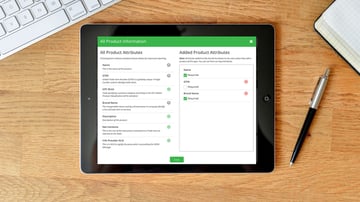Data, when handled well, acts as a unifying language within an ecosystem that’s as complex as the food supply chain, providing a clear, real-time view of operations from farm to fork. It streamlines decision-making by revealing patterns, predicting potential problems, and enabling quick responses to disruptions.
Watch Now: Data at Our Fingertips: Consumer-Led Traceability
Ultimately, good data simplifies complexity by fostering transparency, optimizing processes, and facilitating  collaboration among all stakeholders. But in an industry where precision and speed matter, you need more than good data —you need great insights.
collaboration among all stakeholders. But in an industry where precision and speed matter, you need more than good data —you need great insights.
Listen Up: How Predictive Analytics Will Transform Food Safety
FoodLogiQ Embedded Analytics empowers food brands, manufacturers, and suppliers to harness the power of real-time data, helping them make smarter decisions, improve operational efficiency, and mitigate risk. With the right analytics in place, businesses can transform how they manage suppliers, ensure compliance, and respond to food safety concerns.
Why Data-Driven Decision-Making Matters in the Food Industry
Food supply chains generate vast amounts of data every day, from supplier certifications and audit reports to traceability records and recall incidents. Without a centralized system to analyze and interpret this data, businesses struggle to identify risks and optimize performance. This lack of visibility leads to inefficiencies, compliance gaps, and, in the worst cases, costly recalls that damage both finances and brand reputation.
Read More: The Top 6 Benefits of a Centralized Food Supplier Management System
By leveraging data-driven insights, companies can shift from a reactive approach to a proactive one. Instead of scrambling to resolve quality issues or regulatory violations, businesses with access to real-time analytics can spot trends before they escalate into serious problems. This ability to monitor compliance, track supply chain performance, and streamline recall management is essential in today’s highly regulated food industry.
How FoodLogiQ Embedded Analytics Transforms Operations
 According to Supply Chain Dive, a full 67% of supply chain operators use Excel and other manual spreadsheets a supply chain system, and nearly half of that group considered "outdated systems" a barrier to innovation. While we think that Excel can be a great tool, it's not necessarily ideal for supply chain management.
According to Supply Chain Dive, a full 67% of supply chain operators use Excel and other manual spreadsheets a supply chain system, and nearly half of that group considered "outdated systems" a barrier to innovation. While we think that Excel can be a great tool, it's not necessarily ideal for supply chain management.
So, how do you go from Excel to excellence?
FoodLogiQ Embedded Analytics is designed specifically for the food industry, offering advanced tools that help companies gain full visibility into their operations. One of its key benefits is its ability to track supplier performance in real time. With this capability, food companies can ensure that their vendors remain compliant with industry standards, maintain up-to-date certifications, and consistently meet food safety requirements.
Instead of manually tracking supplier compliance through spreadsheets or disconnected systems, businesses can rely on FoodLogiQ’s centralized dashboard to monitor audit scores, supplier incident history, and overall performance.
Digital Download: The Supplier Relationship Management Playbook
Another critical area where FoodLogiQ Analytics delivers value is in recall and incident management. The cost of a food recall can be astronomical, with financial losses averaging $10 million or more per incident. The ability to quickly and efficiently manage recalls can significantly reduce the financial and reputational damage associated with these events.
Regulatory compliance is another major concern for food businesses, as failure to adhere to safety standards can lead to fines, legal action, and supply chain disruptions. Keeping pace with evolving regulations, such as FSMA 204, requires constant oversight and detailed reporting. FoodLogiQ’s compliance tracking tools make this process more manageable by automating audit reports, tracking performance metrics, and identifying potential compliance risks before they become liabilities. By integrating these analytics into daily operations, companies can ensure they meet industry standards while reducing the administrative burden on their teams.
Digital Download: Guide to FSMA 204 Compliance
Supply chain visibility is also a growing priority for food companies, especially as consumer expectations for transparency continue to rise. With FoodLogiQ’s advanced traceability capabilities, businesses can track products from origin to distribution, ensuring accountability at every step of the supply chain. By analyzing data from millions of tracking events, companies can quickly identify risks, improve inventory management, and respond to food safety concerns with greater accuracy.
The Cost of Ignoring Data Analytics
For food companies that have not yet adopted a data-driven approach, the risks are significant. The financial impact of a poorly managed recall, supplier compliance failure, or regulatory violation can be devastating. Without a clear view of their supply chain and compliance status, businesses face increased exposure to risks that could lead to product withdrawals, legal penalties, and long-term reputational damage.
Digital Download: Consumer Sentiment Report on Food Transparency & Recalls
On the other hand, companies that embrace analytics gain a clear advantage. By using data to monitor compliance, track supplier performance, and streamline quality management, businesses can respond to potential risks before they escalate.
Improved access to real-time insights enables food brands to bring products to market faster, optimize supplier relationships, and enhance overall efficiency. In an industry where transparency and speed are critical, leveraging analytics is no longer optional—it’s essential for long-term success.
Start Making Data-Driven Decisions
As the food industry changes and supply chains become more modernized, companies that fail to embrace data-driven decision-making will struggle to keep up. With FoodLogiQ Embedded Analytics, businesses can transform their approach to supplier management, compliance tracking, recall execution, and supply chain transparency. By leveraging real-time insights, companies can make informed decisions that reduce risk, improve efficiency, and enhance overall food safety.
For food brands, manufacturers, and suppliers looking to stay ahead, the time to invest in tools with robust data capture and analytics is now. Discover how FoodLogiQ Embedded Analytics can help your business navigate today’s challenges and prepare for the future. Schedule a demo today.
Already a FoodLogiQ customer? Here's a step-by-step walkthrough that will help you start leveraging the power of Embedded Analytics today.
Tag(s):
Trustwell Software
Other posts you might be interested in
View All Posts
5 min read
| February 23, 2023
FoodLogiQ’s Winter 2023 Release
Read More
Trustwell News
6 min read
| December 17, 2025
FoodLogiQ Q4 2025 Release: Stronger Foundations for Product Data, Specifications, and Traceability
Read More
Trustwell Software
7 min read
| March 2, 2022

